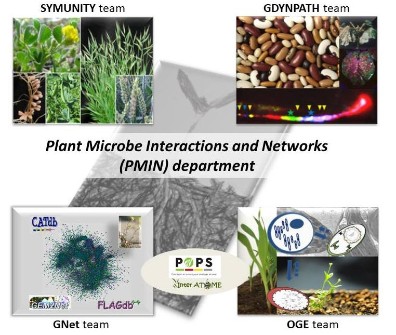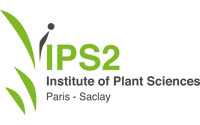PMIN: Plant-Microbe Interactions and Networks
Context
Plants are sessile organisms that develop using resources from their neighboring environment. They are living in a very complex heterogeneous environment, especially at the root level. Microorganisms are part of this complex environment and can have positive or negative roles on plant development as they can be symbiotic or pathogenic. Plants are thus integrating a multitude of information related to nutrition but also biotic and abiotic stress in order to grow. How all this information is integrated and transcribed in gene expression patterns is poorly understood despite that this knowledge should be important for developing a more sustainable agriculture.
Structure of the PMIN department
The Plant Microbe Interaction and Network (PMIN) department is composed of four research teams: Genomic networks (GNet), Organellar Gene Expression (OGE), Genome Dynamics and Pathogen Resistance (GDYNPATH) and Symbiosis and immunity (SYMUNITY). In addition the department hosts the transcriptomic (POPS) and interactomic (InterATOME).
Research
In the PMIN department we aim at studying plants in their (biotic) environment, to better understand at the plant to genome level their (biotic) interaction to this environment with the aim to transpose this knowledge in field conditions.
One of the strengths of the department is to combine high throughput, genetic and functional analyses that allow correlating gene and protein networks with biological interactions.
The GNet group develops statistical methods for gene analysis, applies these methods to understand gene networking in Arabidopsis and aims at transferring this knowledge to crops.
The OGE group, in close collaboration with the Gnet group, develops integrated approaches to map the organellar gene expression networks in response to biotic stresses because organelles are primary targets in plant-pathogen interactions. Making use of the InterATOME platform the OGE team is also identifying the targets of microorganism effectors in plant cells. We believe that these approaches will be very fruitful in the future to identify new actors involved in interaction of the plant with pathogens and/or beneficial microbes that can later be studied by the other members of the department.
Members of the SYMUNITY group are also studying the interaction with beneficial microorganisms and how these interactions can interfere with plant immunity and can be used for future applications in agriculture.
The GDYNPATH group is studying the molecular basis and evolution of disease resistance against legume pathogens.
The PMIN department has a strong experience with Legume biology and Legume-microorganisms interactions using the model Legume M. truncatula together with legume crops such as pea and common bean.
This department consists of 4 teams :
-
GDYNPATH : Genome Dynamics and Pathogen Resistance

Team leader : Valérie Geffroy
-
SYMUNITY : Symbiosis and Immunity
Team leader : Pascal Ratet
-
OGE : Organellar Gene Expression
Team leader : Étienne Delannoy
-
Gnet : Genomic networks
Team leader : Marie-Laure Martin
